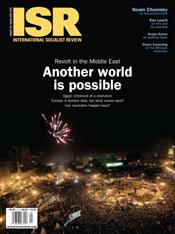Arab responses to Nazism

The Arabs and the Holocaust:
SINCE 9/11, the term “the Arab street” has been used in the United States to caricature opinions across the Arab world, mashing together the thoughts of tens of millions as if they have one mind with a common worldview. This funhouse mirror image of a complex tableau of opinions among a huge swath of humanity has been further distorted in the bigoted clamoring against the proposed “Ground Zero mosque” in lower Manhattan.
Gilbert Achcar’s scholarly but accessible work, The Arabs and the Holocaust: The Arab-Israeli War of Narratives, is a powerful antidote to these ahistorical notions of Arab public opinion, specifically regarding the Holocaust and anti-Semitism. Achcar’s writings on Palestine, Israel, and Islam are familiar to those who’ve studied the Middle East, and in The Arabs and the Holocaust he again applies a Marxist analysis to Arab reactions to both Nazism and anti-Semitism to explain the competing narratives on Israel-Palestine. Even for those well versed in the field, this work contains real gems and useful insights.
By laying out the distinctive histories of the liberal Westernizers, Marxists, nationalists, and fundamentalist pan-Arabists, Achcar allows readers to sort through—and cut against—the dominant trends in English-language historiographies that virtually ignore all but the most extreme reactionary writings. The outsized attention often given the right-wing anti-Semitic Islamists such as Jerusalem’s Grand Mufti during the Second World War, Amin al-Husseini of “your enemy’s enemy is your friend” fame regarding Nazis, is set against the position of the vast majority of the Arab world at that time. During the war, even throughout the 1939–1941 Stalin-Hitler pact, most nationalists, liberals, and communists of the Middle East rejected Nazism and anti-Semitism outright.
The most compelling story that exemplifies this political trend took place in Iraq in June 1941. Baghdad’s Jewish community was set upon by a mob in a pogrom that killed between 129 and 180 Jews. Yet during this two-day assault, Arab Muslims opened their homes to safeguard their Jewish brethren, the government deployed troops against their fascist attackers, of whom hundreds were killed in retaliation for their anti-Semitic violence, and the Jewish victims were paid compensation by the Iraqi state. What’s more, it was the pro-British prime minister of Iraq, Nuri al Sa’id, whose threats to expel Jews after the war led to the exodus of 135,000, the largest Jewish community of the Arab East. As Achcar cites from Robert Satloff’s pro-Israel work, Among the Righteous:
At every stage of the Nazi, Vichy, and Fascist persecution of Jews in Arab lands, and in every place that it occurred, Arabs helped Jews. Some Arabs spoke out against the persecution of Jews and took public stands in unity with them. Some Arabs denied the support and assistance that would have made the wheels of the anti-Jewish campaign spin more efficiently. Some Arabs shared the fate of Jews and, through that experience, forged a unique bond of comradeship. And there were occasions when certain Arabs chose to do more than just offer moral support to Jews. They bravely saved Jewish lives, at times risking their own in the process. Those Arabs were true heroes.
In a theme that echoes throughout, it is often the Arab forces most aligned with the interests of imperialism, first British then American, that express the deepest hostility toward Jews. The Saudi monarchy, perhaps the only family to name a country after itself, lies at the heart of the most reactionary pan-Islamism. Oil wealth from what is now Saudi Arabia is the source of Western governments’ silence about the sharia law of the Wahhabi monarchy, which is hostile even to non-Sunnis. As Achcar explains, its “close and enduring ties with the United States go a long way toward explaining the curtain of silence drawn, with American complicity, around the basic features of the Saudi state, the most obscurantist, antidemocratic, and misogynistic in the world.”
The Arabs and the Holocaust exposes the well-financed propaganda machine out of Washington, with Web sites such as that of the Middle East Media Research Institute (MEMRI) that translate and pull Arabic and Persian documents out of context to create a tapestry of anti-Semitism out of anti-Zionist writings. Achcar, however, makes no excuses for those liberal Arab forces that in their zeal to oppose Zionism conflate it with anti-Semitism. He writes, “Every Arab who recognizes that these anti-Semitic ravings or mindless denials of the Holocaust, far from undermining the Israeli cause as their authors intend, in fact help Israel produce anti-Arab propaganda has already taken a big step toward understanding why they are so inept.”
Today’s Palestine solidarity activists, daily inculcated with lies and half-truths in the mainstream media, could make great use of the documents cited here from early movements like that of the main leftist armed organization of the Palestine Liberation Organization, the Popular Front for the Liberation of Palestine, headed by George Habash. In 1969, the PFLP wrote, “The aim of the Palestinian liberation movement is the establishment of a national democratic state in Palestine in which the Arabs and Jews can live as equal citizens with regards to rights and duties.…”
Achcar has once again provided leftists with a useful ideological tool in the battle against Zionism. Perhaps the best way his publisher can gain attention in the current U.S. environment is to mail off copies to Rush Limbaugh, Glenn Beck, and Sarah Palin. After all, its title has two of the most incendiary words in the English language today—“Arabs” and “Holocaust.” Perhaps if these clowns were to attack it, as they surely they would (without cracking it open), more scholars and activists will discover this treat.


 Facebook
Facebook Twitter
Twitter Google+
Google+ Tumblr
Tumblr Digg
Digg Reddit
Reddit StumbleUpon
StumbleUpon
